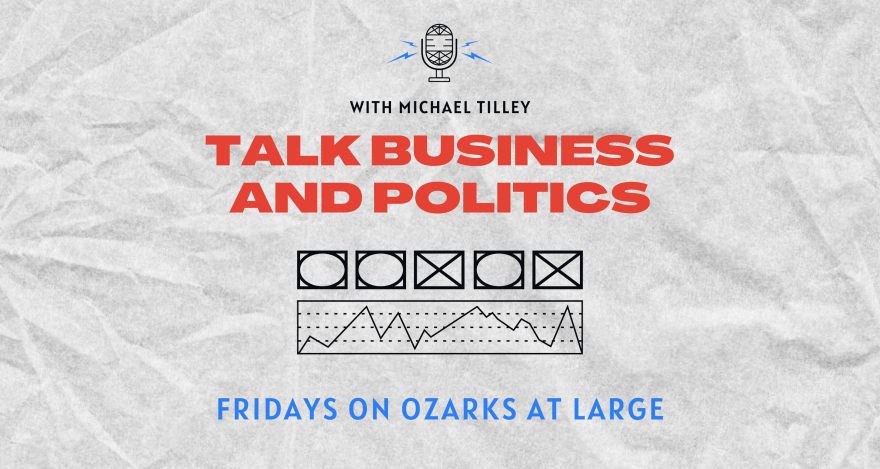Let’s start our show today with our regular roundup of the latest news from the Arkansas River Valley. Michael Tilley with Talk Business & Politics spoke with Ozarks at Large about a handful of topics, including a new city ordinance in Fort Smith to provide some guardrails on major purchases by the city after the purchase of five waterslides for Parrot Island Waterpark.
Michael Tilley: Originally, it was going to be a $2.1 million deal. Now it’s going to be closer to $6.5 or $6.8 million. We still don’t know yet what the city’s going to do with these waterslides. But Director Christina Catsavis, who has been opposed to acquiring and installing these new waterslides, wanted to put up some guardrails to prevent this from happening again.
Rightly so, she noted that the city board approved this acquisition a year or so ago. It didn’t have a study session — it was just kind of shoved through. It was a last-minute item that popped up, and it didn’t have a lot of discussion.
Her plan is that any capital project — now these are new capital projects, not ones that have already been approved because every year all the city departments bring forth a capital improvement plan — this is outside of that. This is new things that pop up. And every city will have new things pop up during the year. But any capital project that’s going to cost more than $500,000 has a seven-day hold on it, and it has to go through a public study session before it can be placed on a voting agenda.
And she’s got some other things. For example, the staff must provide cost estimates, funding sources, real details on the project. There is an emergency exception. For example, if you remember two or three months ago, there was a major water-pipe bust, and there had to be spending of a few million dollars to fix that. There’s an exception in this for true emergencies that threaten public health or safety.
And then there’s also in her ordinance where there will be an auditor that follows up and conducts annual compliance to make sure that the money is spent like it’s supposed to. So this was discussed at Tuesday’s study session of the Fort Smith board. There’s really no opposition. Some of the board members mentioned a couple of tweaks. The director was open to those. So right now it is set to be voted on, or at least considered again and possibly voted on, at the Nov. 18 regular board meeting.
So that’s, I guess, one of the first responses — or I’m not sure I’d call it little — but that’s the first response from a procedural standpoint to that Parrot Island waterslide debacle.
Matthew Moore: Well, speaking of the Parrot Island Waterpark, it is estimated to have a net operating loss in the year 2025, in part due to weather. But cumulative income shows that it’s actually done decently well.
Michael Tilley: Yeah, it has. You know, the waterslide thing has caused some folks to say, well, we don’t need to be in the amenity business, we don’t need to be in the parks business. You know, this is just like the Fort Smith Convention Center — it loses money every year. But that is not the case.
The Parrot Island Waterpark folks — now these numbers have not been audited, they’re from Parrot Island, but I can’t imagine why they’d want to lie about these numbers — the park has cumulative net operating income of $1.1 million since it opened in 2015. And there’s only been three years that it reported a loss.
You mentioned it will report a loss this year because of an unusual number of rain days. And they also had some expenses related to maintenance that was not expected, and it was pretty expensive maintenance. That’s going to happen from time to time. Their other big negative year was during 2020, the pandemic year.
But we put the story out, and frankly, I was surprised when I finally got all the data. I had to request it from the city and from the waterpark folks. When we got the data, I was surprised that it’s had that kind of revenue generation since 2015. And you look — their last attendance number was 105,000 folks who attended in just those summer months. That’s a decent draw.
I’ll let other folks determine whether it’s worth the investment. Both the city and the county combined put in a little over $12 million — I think it’s getting close to $13 to $15 million since it was first approved. That’s not each; that’s combined, so half each pays half. But it is an amenity. It’s a big draw. And I was surprised, like I said, surprised that it’s made money.
Matthew Moore: Speaking of money in Fort Smith, the sales tax revenue September report showed better results than they were expecting and were this time last year.
Michael Tilley: Yes. You know, the tax revenue in Fort Smith got off to a slow start, and there was a little bit of “uh-oh,” but it’s recovered in the last couple of months.
In the September report, the city’s share of the Sebastian County tax was a little over $2 million. That was up 6.6%. The city’s 1% sales tax that’s used for street work and now for some consent decree federal work on the sewer system generated a little over $2.5 million. That was up 7.4% compared to September of last year.
That countywide tax revenue, year to date, is down just 0.3%, and the 1 percent tax is down less than 1 percent. So the numbers have recovered. I’ll be somewhat eager to see the reporting months that will include consumer spending in October and November to see if any of these shutdown fears and the real impact from the shutdown were felt in this local market. But the trend is looking much better for the city of Fort Smith in terms of tax revenue going into the back half of 2025.
Matthew Moore: Finally here, some big news out of the University of Arkansas–Fort Smith that probably deserves a little more recognition and credit than it’s received. The university received some advanced manufacturing equipment to support workforce training.
Michael Tilley: Yeah, this is — and I’m glad we’re talking about this — this is not one of those sexy headlines. It’s not controversial like waterslides or whatever, and we didn’t get a lot of traffic on the story. But this is a big deal. This is for the underlying economy — the one that kind of moves in the background we don’t see — but it’s really important to our everyday lives.
Yeah, the University of Arkansas–Fort Smith received almost $6 million. It’s about $5.5, $5.7 million for this. It’s the Higher Industry Readiness Through Educational Development, or HIRED, program. Governments love these acronyms.
But Dr. Teresa Riley, the chancellor at the university, dedicated $1.7 million of that to create this Manufacturing Academy. And so they announced recently they’ve begun to install some of this advanced manufacturing lab equipment.
A couple of things really to point out: one, this is real equipment. This is not advanced manufacturing equipment that the company bought 10 years ago and they’re not using anymore, so they’ve given it to the university. This is real-time use, relatively modern. Of course, the way technology changes — will it be modern a year from now? Who knows. But now it’s good equipment on which to train these students.
Some of the training is robotics, systems integration, materials testing, quality assurance. And, you know, we talk often about the Arkansas College of Health Education training doctors and physician assistants, that kind of thing. But this is — I’m not saying it’s just as important, but this is critical also, especially for Fort Smith and Arkansas, frankly, that have struggled to return manufacturing jobs.
You know, in Fort Smith, at one time there were 29,200. That was the peak of manufacturing jobs in the region. That’s down to a little over 18,000 now. And we’re never going to get back there because plants that used to hire 1,000 people to produce X number of widgets really only may need 500 people because of equipment and productivity gains in that area.
But this is good to see. I think the university received a good chunk compared to other universities of money through that HIRED program. And it’s good to see it’s being installed. I’m eager — and I think I know you guys are reporting on it more, we’re going to report on it more — but again, it’s just one of those things that you’ve got to be able to do to recruit companies and to train the workforce for the companies already here. I just can’t stress how much this is very important to the underlying economy.
That was Michael Tilley with Talk Business & Politics speaking to Ozarks at Large’s Matthew Moore. He joins us every Friday to give us the latest news from the Arkansas River Valley. You can find more at TalkBusiness.net.
Ozarks at Large transcripts are created on a rush deadline. Copy editors utilize AI tools to review work. KUAF does not publish content created by AI. Please reach out to kuafinfo@uark.edu to report an issue. The audio version is the authoritative record of KUAF programming.








